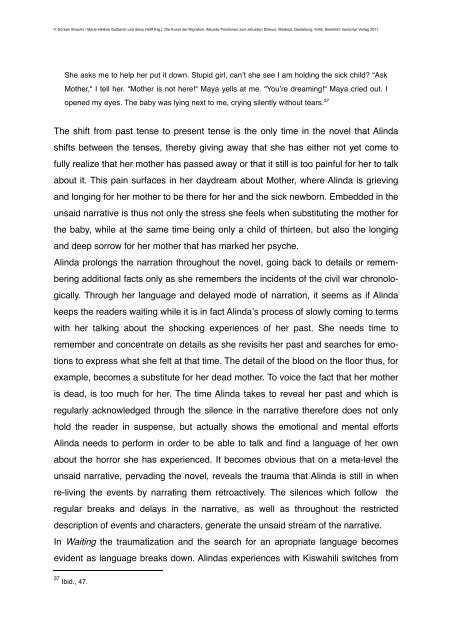Waiting – A Novel of Uganda at War - Migration & Media
Waiting – A Novel of Uganda at War - Migration & Media
Waiting – A Novel of Uganda at War - Migration & Media
You also want an ePaper? Increase the reach of your titles
YUMPU automatically turns print PDFs into web optimized ePapers that Google loves.
© Doreen Strauhs / Marie-Hélène Gutberlet und Sissy Helff (Hg.): Die Kunst der Migr<strong>at</strong>ion. Aktuelle Positionen zum aktuellen Diskurs. M<strong>at</strong>erial, Gestaltung, Kritik, Bielefeld: transcript Verlag 2011.<br />
She asks me to help her put it down. Stupid girl, can’t she see I am holding the sick child? “Ask<br />
Mother,“ I tell her. “Mother is not here!“ Maya yells <strong>at</strong> me. “You’re dreaming!“ Maya cried out. I<br />
opened my eyes. The baby was lying next to me, crying silently without tears. 37<br />
The shift from past tense to present tense is the only time in the novel th<strong>at</strong> Alinda<br />
shifts between the tenses, thereby giving away th<strong>at</strong> she has either not yet come to<br />
fully realize th<strong>at</strong> her mother has passed away or th<strong>at</strong> it still is too painful for her to talk<br />
about it. This pain surfaces in her daydream about Mother, where Alinda is grieving<br />
and longing for her mother to be there for her and the sick newborn. Embedded in the<br />
unsaid narr<strong>at</strong>ive is thus not only the stress she feels when substituting the mother for<br />
the baby, while <strong>at</strong> the same time being only a child <strong>of</strong> thirteen, but also the longing<br />
and deep sorrow for her mother th<strong>at</strong> has marked her psyche.<br />
Alinda prolongs the narr<strong>at</strong>ion throughout the novel, going back to details or remem-<br />
bering additional facts only as she remembers the incidents <strong>of</strong> the civil war chronolo-<br />
gically. Through her language and delayed mode <strong>of</strong> narr<strong>at</strong>ion, it seems as if Alinda<br />
keeps the readers waiting while it is in fact Alinda’s process <strong>of</strong> slowly coming to terms<br />
with her talking about the shocking experiences <strong>of</strong> her past. She needs time to<br />
remember and concentr<strong>at</strong>e on details as she revisits her past and searches for emo-<br />
tions to express wh<strong>at</strong> she felt <strong>at</strong> th<strong>at</strong> time. The detail <strong>of</strong> the blood on the floor thus, for<br />
example, becomes a substitute for her dead mother. To voice the fact th<strong>at</strong> her mother<br />
is dead, is too much for her. The time Alinda takes to reveal her past and which is<br />
regularly acknowledged through the silence in the narr<strong>at</strong>ive therefore does not only<br />
hold the reader in suspense, but actually shows the emotional and mental efforts<br />
Alinda needs to perform in order to be able to talk and find a language <strong>of</strong> her own<br />
about the horror she has experienced. It becomes obvious th<strong>at</strong> on a meta-level the<br />
unsaid narr<strong>at</strong>ive, pervading the novel, reveals the trauma th<strong>at</strong> Alinda is still in when<br />
re-living the events by narr<strong>at</strong>ing them retroactively. The silences which follow the<br />
regular breaks and delays in the narr<strong>at</strong>ive, as well as throughout the restricted<br />
description <strong>of</strong> events and characters, gener<strong>at</strong>e the unsaid stream <strong>of</strong> the narr<strong>at</strong>ive.<br />
In <strong>Waiting</strong> the traum<strong>at</strong>iz<strong>at</strong>ion and the search for an apropri<strong>at</strong>e language becomes<br />
evident as language breaks down. Alindas experiences with Kiswahili switches from<br />
37 Ibid., 47.


